 Petzlover
Petzlover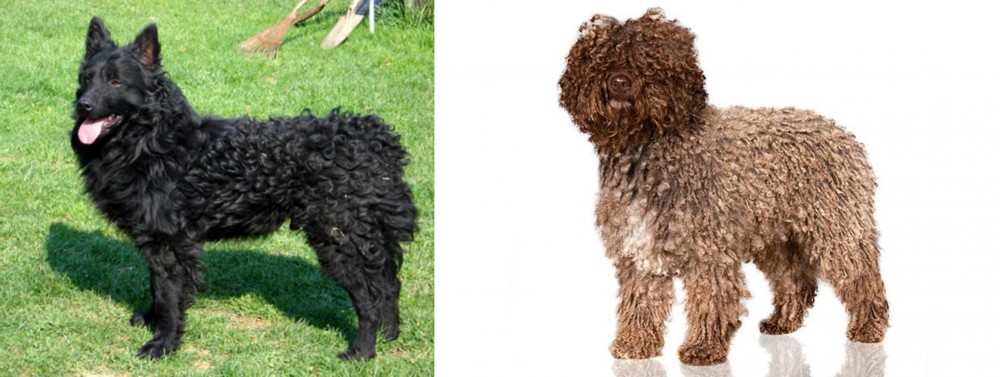 Croatian Sheepdog is originated from Croatia but Spanish Water Dog is originated from Spain. Both Croatian Sheepdog and Spanish Water Dog are having almost same height. Both Croatian Sheepdog and Spanish Water Dog are having almost same weight. Both Croatian Sheepdog and Spanish Water Dog has almost same life span. Both Croatian Sheepdog and Spanish Water Dog has almost same litter size. Both Croatian Sheepdog and Spanish Water Dog requires Moderate Maintenance.
Croatian Sheepdog is originated from Croatia but Spanish Water Dog is originated from Spain. Both Croatian Sheepdog and Spanish Water Dog are having almost same height. Both Croatian Sheepdog and Spanish Water Dog are having almost same weight. Both Croatian Sheepdog and Spanish Water Dog has almost same life span. Both Croatian Sheepdog and Spanish Water Dog has almost same litter size. Both Croatian Sheepdog and Spanish Water Dog requires Moderate Maintenance.
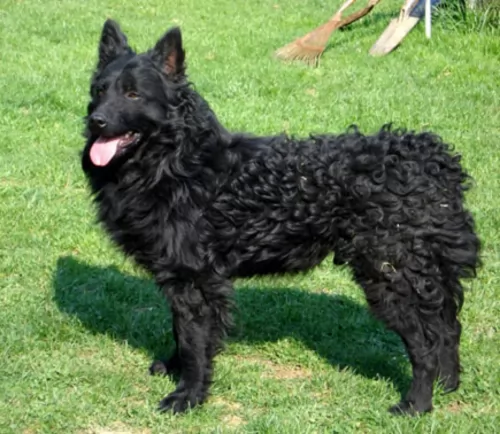 Known also as Hrvatski Ovkars, the black Croatian Sheepdog has been in Croatia since the 7th century already. He was brought to the region by Croats who wanted a strong working dog.
Known also as Hrvatski Ovkars, the black Croatian Sheepdog has been in Croatia since the 7th century already. He was brought to the region by Croats who wanted a strong working dog.
Over the centuries, the dog hasn’t changed much in looks, and in 1935 a breeding program for the dog was developed. A certain Dr. Romic started the program with 3 dogs, and the work he did with the dogs saw that the Croatian Sheepdog got official recognition a few decades later.
In March 1968, the Yugoslav Kennel Club adopted the breed standard, and since then, several kennels recognize the Croatian Sheepdog. The dog is still not known particularly well outside their own county, but in Croatia it is essentially known as a companion dog.
 Bred in Spain to guard and herd sheep, the Spanish Water Dog was also used in hunting because he could retrieve in water. The breed is closely aligned with other water dogs like the Irish Water Spaniel, Portuguese Water Dog and French Barbel. It is especially true that the Spanish Water Dog and the Portuguese Water Dog share some of the same ancestors. The two breeds are closely related.
Bred in Spain to guard and herd sheep, the Spanish Water Dog was also used in hunting because he could retrieve in water. The breed is closely aligned with other water dogs like the Irish Water Spaniel, Portuguese Water Dog and French Barbel. It is especially true that the Spanish Water Dog and the Portuguese Water Dog share some of the same ancestors. The two breeds are closely related.
In the early days of the breed, they were separated into three different sizes and types. The dogs from Northern Spain were smaller than the others and came from the regions of Cantabria and Asturias. These lighter colored dogs eventually became their own breed – the Cantabria Water Dog. The second group came from western Andalusia marsh lands. He had a long chorded coat. The third group was the strongest and largest and came from the southern Andalusian sierras. This was by far the largest and most influential group, most of whom were herders. Eventually the groups interbred and today’s SWD carries the traits of all three. They were and still are a very versatile breed. In addition to herding they fished or retrieved for hunters.
The breed was revived in the 1970”s by two breeders, Santiago Montesinos and Antonio Garcia Perez travelled through southern Spain to buy or borrow dogs for breeding. By 1980, they had established the Spanish Water Dog Club of Spain and reestablished the breed. They fought to the breed recognized in Spain first. After five years of hard work, the Federation Cynologique Internationale recognized the breed permanently in 1999.
The UKC, or United Kennel Club, of the United States, recognized the breed in 2001, accepting them for confirmation by 2004. In the United States the breed was championed by Ken and Jerry Mann to attain that UKC recognition. Still the AKC, or American Kennel Club, held out on their recognition. The Manns showed the SWD in 2000 in the AKC Rare Breed Conformation and the UKC multi-breed show in 2004.
The Manns also used their breed for herding in the United States in entered them into the herding competition. In the they advocated for and got the SWD into the herding group for confirmation with the UKC in 2013. The American Kennel Club approved the requests of the Spanish Water Dog Club, Inc and recognized the breed in 2005 as foundation stock. By 2008 the AKC recognized the SWD to be able to compete in field trials by not conformation. In 2015 the SWD will be admitting to AKC conformation and fully recognized as a member of the herding group. They were also recognized by the American Herding Breed Association in 2007.
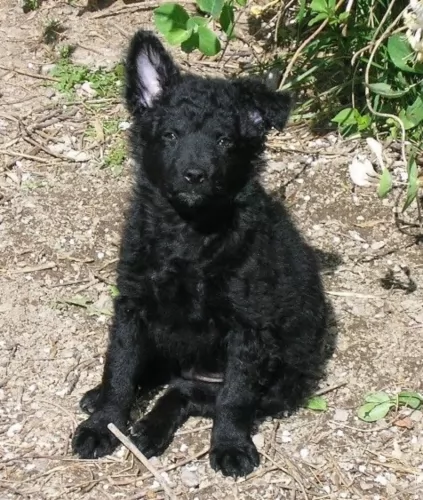 The Croatian Sheepdog is a medium sized, muscular dog which stands roughly 40 – 53cm at the withers and weighs 13 to 20kg. The head is wedge shaped and lean and he has brown to black colored eyes.
The Croatian Sheepdog is a medium sized, muscular dog which stands roughly 40 – 53cm at the withers and weighs 13 to 20kg. The head is wedge shaped and lean and he has brown to black colored eyes.
The triangular-shaped ears are medium sized and semi-erect or erect. The tail of the dog is often docked, but if not it is set high and is inclined to curl over the back.
The dog is nearly always black although you’ll find a few white hairs on the throat or chest or on the legs and toes. The double coat is of medium length, being wavy or even slightly curly.
The Croatian Sheepdog is an athletic, alert dog and he has high energy levels, loving to be put to work or to be busy with one or other activity. He fits in well as a family pet and gets on well with children and pets in the home, but he is going to need plenty of exercise and games.
This particular dog won’t do well with a family of couch potatoes as he craves lots of activities. He will certainly benefit from training and socialization, and because he is intelligent he learns easily and then he is obedient and ready to please.
He is a dominant, confident dog who thrives on attention from his human family. He isn’t a dog you can just stick in the backyard as he is social and craves activity and attention. He is wary of strangers and makes an excellent watchdog.
 The Spanish Water Dog is an athletic, medium size, robust breed that is not as tall as it is long. In countries like the US, the tails are docked but it is not a conformation fault if they are not. The carry themselves with pride and elegance, have a strong head and expressive eyes which are brown. They have flat skulls and wide set eyes. Their paw pads, eye-rims and nose should be darker than their coat or at least the same color. Their eyes are chestnut, hazel or dark brown and their ears are medium height and triangular. His coat is curly and his topline is straight. With a broad chest and arched rib, he is a very athletic looking dog. The breed has much respiratory capacity with broad shoulders and straight sturdy legs. The breed has rounded feet , tight toes, and resistant pads.
The Spanish Water Dog is an athletic, medium size, robust breed that is not as tall as it is long. In countries like the US, the tails are docked but it is not a conformation fault if they are not. The carry themselves with pride and elegance, have a strong head and expressive eyes which are brown. They have flat skulls and wide set eyes. Their paw pads, eye-rims and nose should be darker than their coat or at least the same color. Their eyes are chestnut, hazel or dark brown and their ears are medium height and triangular. His coat is curly and his topline is straight. With a broad chest and arched rib, he is a very athletic looking dog. The breed has much respiratory capacity with broad shoulders and straight sturdy legs. The breed has rounded feet , tight toes, and resistant pads.
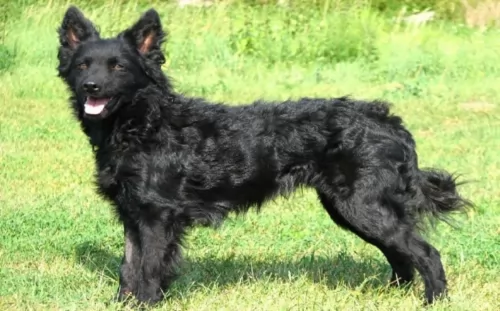 The Croatian Sheepdog isn’t a demanding dog, although he will be relying on you to give him plenty of exercise. He wants to please and will fit into life in the city or life in the country, so long as he gets regular exercise.
The Croatian Sheepdog isn’t a demanding dog, although he will be relying on you to give him plenty of exercise. He wants to please and will fit into life in the city or life in the country, so long as he gets regular exercise.
It doesn’t take much to keep the Croatian Sheepdog happy and content, and when he thrusts his wet nose into your hand and you see his wagging tail, you’ll know its all been worth it to give this pet the best as he gives you his undivided love and loyalty.
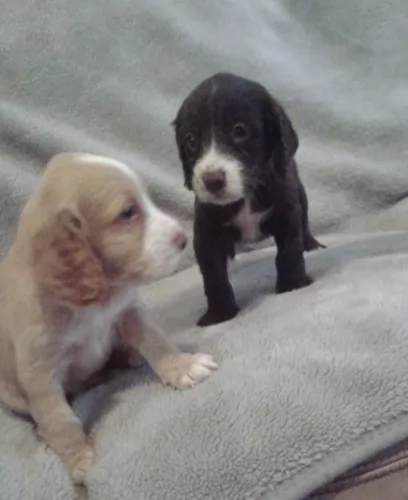 The Croatian Sheepdog is a healthy dog breed. He is the kind of pet that won’t cost you a lot of money because he is low maintenance. In fact he is a dog which has developed resistance to many diseases.
The Croatian Sheepdog is a healthy dog breed. He is the kind of pet that won’t cost you a lot of money because he is low maintenance. In fact he is a dog which has developed resistance to many diseases.
With good food, exercise and love and care he won’t cost you much in terms of vet’s fees. He can live to be 12 to 15 years of age.
Even though he is a healthy kind of dog, there are some dog illnesses that you will want to be aware of such as bloat and eye problems. Also if you aren’t going to let him become a parent, then spaying or neutering your Croatian Shepherd will have numerous health benefits for him.
 The Spanish Water Dog has much of the same health problems as the other water dogs and dogs their size and heritage. Here are some of the health issues they are prone to.
The Spanish Water Dog has much of the same health problems as the other water dogs and dogs their size and heritage. Here are some of the health issues they are prone to.
• Exocrine Pancreatic Insufficiency – inability to digest food – can be treated.
• CHG – Congenital Hypothyroidism with Goiter – inherited and pups don’t grow correctly.
• Neuroaxonal Dystrophy – cognitive and muscular dysfunction. Vitamin E and insulin deficiency
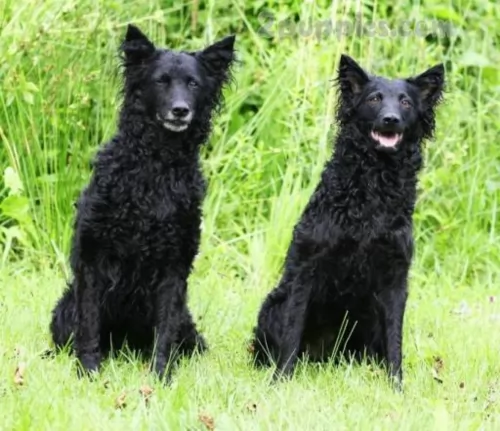 The Croatian Sheepdog has always been a working dog and is regarded as a hardy, low maintenance dog. He will require minimal grooming so a good brush twice a week will suffice.
The Croatian Sheepdog has always been a working dog and is regarded as a hardy, low maintenance dog. He will require minimal grooming so a good brush twice a week will suffice.
There are excellent and convenient dog foods on the market which have been specifically manufactured to ensure your dog gets all the vitamins and minerals he needs for health and energy. Stick to the feeding instructions on the label so that he maintains his lean, muscular body.
Raw meat can be expensive, but it will be to his benefit if you can include some raw meat into his kibble every now and then. If you are unsure in any way as to how to feed your dog, your vet can give you good advice on a food that caters for his age and his activity levels. Always make sure that he has a fresh bowl of water available.
 1.Feeding the puppy – Because of the breed propensity to some genetic dietary issues it is important to feed high quality food made from mostly meat. Avoid grains as much as possible. Don’t feed adult foods to the puppies. Feed puppy breed specific or medium size dogs.
1.Feeding the puppy – Because of the breed propensity to some genetic dietary issues it is important to feed high quality food made from mostly meat. Avoid grains as much as possible. Don’t feed adult foods to the puppies. Feed puppy breed specific or medium size dogs.
2.Feeding the adult - Feed the adult as little grain and as much protein as possible. Feed adult breed specific or medium size dog’s food.
4. Games and Exercises – This is a working breed. Remember they are both herders and hunters and need exercise. They love strenuous hiking, running, jogging, long walks, swimming and playing fetch. Don’t over work the puppy/young dog until they have matured and their growth plates close.